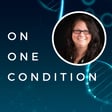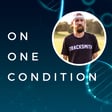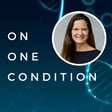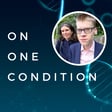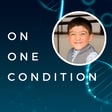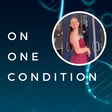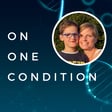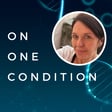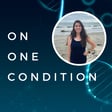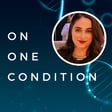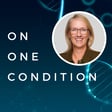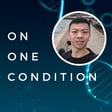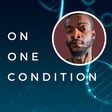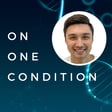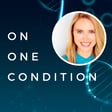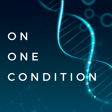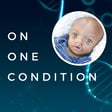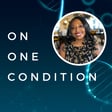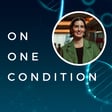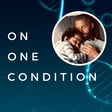Become a Creator today!Start creating today - Share your story with the world!
Start for free
00:00:00
00:00:01

Episode 65: Kevin Alexander - PKU
Kevin opens up about living with PKU, a rare metabolic condition diagnosed at birth that requires lifelong dietary management. As a passionate advocate and storyteller, Kevin walks us through his journey, from early challenges of growing up with a restrictive diet to becoming a global voice for the PKU community. The conversation dives into mental health, feelings of isolation, access disparities in healthcare, and the healing power of music and connection. Kevin’s vulnerability and perspective offer not just education, but comfort to others navigating rare diseases.
The song that Kevin chose is Shadow Days by John Mayer.
Transcript
Introduction to the Podcast
00:00:00
Speaker
Hi, I'm Sylvain Bertolo and you're listening to On One Condition, a podcast to raise awareness about health conditions by listening to people who leave them every day. My guest today is Kevin Alexander and we're going to talk about PKU.
00:00:15
Speaker
Hi Kevin, good to have you on the podcast. How are you? Thank you. Thank you for having me. Doing well. So we're going to talk about PKU, but I love starting with a song and I understand it might be a tough question for you. So could you tell us which song you chose and why?
00:00:31
Speaker
Sure. ah Yes, it was a difficult question. I'm a musician. I've i've been playing guitar for 30 years and I'm just an avid music lover and I listen to a lot of music. But when I saw that question the other day, I thought about a song from John Mayer called Shadow Days on an album called Born and Raised.
00:00:49
Speaker
and It's one of my favorite albums of his. It flies under the radar for John Mayer fans, but I love the album, Start to Finish. and I just really like the song because you know kind of reminds me of that the importance of remembering your past, but at the same time, not living in the past. and I kind of went through a phase of in the last few years where I hosted a podcast about the rare disease experience.
Kevin's Personal Journey with PKU
00:01:11
Speaker
And it was something that I kind of dealt with a lot of things from the past and shared a lot of my stories from the past, but I'm also in a different phase now where I am thinking about the future, you know, and just appreciating the past, but not living in the past.
00:01:26
Speaker
I like that, remembering your past and not living in the past. Now I'm going to kind of ask you to to maybe live in your past a bit, but is is it something that was difficult for you? Like, were you actually living in your past at some point?
00:01:43
Speaker
Yeah. So, you know, i've I've shared this story publicly, so I don't mind sharing. But in 2022, I visited a PKU conference in the U.S. That's one that I go to every every chance that I get every few years when they have a conference.
00:01:56
Speaker
At the conference, there was a presentation on PKU and mental health. While sitting in that session, I realized that just the complexities of, mean, mental health in general, but at the same time, when you're living with a rare disease condition,
00:02:10
Speaker
There's a whole aspect of mental health that sometimes flies under the radar that people don't talk about. And at the same time with PKU in specific, they're the way that PKU can impact the brain has a direct consequence on our mental health.
00:02:25
Speaker
And so I started thinking about all of that and then started sharing a lot of these stories from my past. I, you know, worked in broadcast journalism and just had a lot of different experiences in life. And and all of it had kind of combined to influence the way that I approach PKU advocacy. So I started kind of, you know, exploring some of those events and stories from my past and learning how to deal with all of that, but at the same time, learn how to live in the present as well.
00:02:51
Speaker
Yeah, and and it's interesting that you mentioned mental health because it's something we talk about a lot on the podcast, although it's somehow not necessarily addressed by healthcare care system in general.
00:03:06
Speaker
But especially with rare diseases, like one of my previous guests mentioned a group focused on mental health for people with rare diseases. And I found that incredible that exists and so great, but I know it's not accessible to everyone, unfortunately.
00:03:23
Speaker
Yeah, so it was something I explored for a while. you know, I've had different things I've done in advocacy over the years, but this podcast was called Never Give Up a Rare Disease Podcast. And it's actually something i've I'm no longer producing. it's a It was a storytelling podcast, so it wasn't interview-based. It was stories about my life.
00:03:41
Speaker
There were a few episodes where I was on location and I did interview people there. But mostly it was stories either from my life or stories that I've encountered in advocacy or even a few stories from history.
00:03:52
Speaker
And all of it exploring that relationship between life and mental health and the rare disease experience. Wow. Interesting. So focusing on PKU, could you tell us how you were
Understanding PKU: Diagnosis and Treatment
00:04:07
Speaker
diagnosed?
00:04:07
Speaker
Sure. I have heard this story many, many times. I do not remember it because i was diagnosed with PKU at birth, but my grandmother was actually taking care of me when I was about nine days old. My parents were at work and she was taking care of me that day.
00:04:21
Speaker
And she received a phone call from the family physician who said there was an abnormal result on Kevin's newborn screening test. And as most people, my parents, my grand my grandmother, my They didn't really know much about newborn screening, and even the doctor who called her did not know anything about PKU and admitted he had to consult his medical textbooks about PKU. And fortunately, he was able to give them a story of hope, which was, so long as you follow this diet, he's going to be okay, or this treatment now we refer to it.
00:04:53
Speaker
But a lot of people, they they don't hear that at the very beginning. They only hear the worst consequences. So PKU was actually the first a rare disease detected through newborn screening.
00:05:04
Speaker
The newborn screening blood spot test was created specifically for PKU and has since expanded to a variety of other rare diseases. And so if it's not detected immediately at birth, it leads to lifelong developmental delay and in most cases, institutionalization.
00:05:20
Speaker
I was detected at nine days of age, immediately placed on treatment, which the the simple explanation for PK treatment, at least historically, has been low-protein diet modified to to be low in a particular amino acid that's found in protein that I can't metabolize.
00:05:38
Speaker
and consumption of a medical drink that contains all of the protein that we need to survive. You know, because the way that PKU basically works is there's an enzyme in the liver that does not properly metabolize an amino acid called phenylalanine.
00:05:52
Speaker
If that amino acid builds up in the body, it enters the bloodstream and eventually makes its way into the brain and crosses the blood-brain barrier and causes brain damage. That presence of that amino acid phenylalanine is what they're looking for in newborn screening.
00:06:07
Speaker
and throughout life as we get regular blood tests to see how we are doing with PKU. um And so it's extremely critical to to detect newborn screening shortly after birth to have that immediate intervention and put someone on treatment.
00:06:21
Speaker
And my story and the story of so many other people, you know, most people with PKU these days, at least in countries where newborn screening is is actually provided, Our story is that we are detected at birth. We are placed on treatment. And it's it's a long, complicated story about access to that treatment, but the treatment exists and we are, ah for the most part, put on it immediately after birth.
00:06:43
Speaker
And you said that newborn screening was started for PKU specifically. Is it widespread the US? Because I know it works by state. So do you know if it's applied in all states?
00:06:56
Speaker
So, yes. So the in the United States, every state provides some form of newborn screening and every state so happens to screen for PKU. However, not every state screens for the same the same rare diseases.
00:07:10
Speaker
So we have we have something in the U.S. called the Recommended Uniform Screening Panel, which is a so a list of rare diseases that the federal government recommends that people screen for. But not every state, they use it as a guide, but not every state follows everything on that list.
00:07:24
Speaker
Okay. But you said that all states screen for PKU. Correct. Pretty much anywhere in the world where newborn screening exists at all, they screen for PKU. Yeah. yeah So do you know if there are still people for whom it results in brain and damage or not?
00:07:41
Speaker
So yeah, in in my journeys, which I can kind of delve into more later, but I produced a film in 2013 and it was about a girl who was born in Mexico and newborn screening was not required.
00:07:54
Speaker
And her parents, it was presented to them as an option, but not explained exactly what it is. They were given the option, did not make, they chose not to do newborn screening because they didn't know, really understand what it was. 13 months later, their daughter was diagnosed with PKU after a long diagnostic odyssey of trying to figure out what was, what was going wrong.
00:08:18
Speaker
And so she um she is now an an adult, but she's under the care of her parents and she's had lifelong developmental delay. Okay. Well, that must be heartbreaking knowing that there was one thing that is relatively simple that could have been done. and It's an interesting contrast because that's her story.
00:08:37
Speaker
And I know someone else who's the same age. He was actually the first person I ever met with PKU. He was five years old. And I interviewed his family and him and his mother in one of the the first films that the first PKU film that I created.
00:08:50
Speaker
And he recently scored an almost perfect on his standardized testing here in the United States intercollege, the ACT. And he's now in college for engineering. And they're the same age.
00:09:02
Speaker
The main difference being he received newborn screening, was placed on treatment, and she did not. Yeah, yeah. That's crazy. Yeah. it's It's so frustrating knowing that this can still happen, unfortunately.
00:09:15
Speaker
So going back to how you manage PKU, so you mentioned medical drink, drink ah you mention treatment, but you started by saying about a low-protein diet. So is this the first step then?
Challenges and Advances in PKU Treatment
00:09:33
Speaker
So that's been the standard treatment for, i mean, since the 1950s. That's when the the first treatment for PKU was developed was in the 1950s is when they discovered that if you if you modify the diet to be low in protein, and then you also supplement that with a drink that's full of protein that's safe for us to have, ah that that's what eventually evolved into the standard for PKU treatment.
00:09:59
Speaker
I saw a phrase the other day, actually just yesterday, that I really, really liked. It was from someone I know in in Europe who referred to it no longer as the low-protein diet or the PKU diet, but as a nutritional therapy.
00:10:14
Speaker
And I think that's a great term because it emphasizes, it's a reality that's common for many people with metabolic disorders, not just PKU. Whereas, you know, the the diet that they have to consume might be a little different. It's still, to use the word diet, and people think it's a choice.
00:10:29
Speaker
They think it's a, you know, they they can they think about weight loss diets or whatever, and they don't understand the criticality of this treatment, this medical treatment. So nutritional therapy really does, I think, a good job of explaining it in medical terminology that's it's clear about how essential it is.
00:10:46
Speaker
That is the foundation of PKU treatment. So this nutritional therapy, which is, in our case, a diet that is modified to be low in protein plus this medical drink, that's the foundation. However,
00:10:58
Speaker
in the last 20 years or so, at least here in the United States, and they're becoming more and more available in other places. But there are treatments that have either already been approved and available or treatments that are in development that are medications that, like I am on one now, the generic the name of it is called saproterin or saproterin.
00:11:19
Speaker
And it is a pill or they're pills that I take each day that allow me to eat a quote unquote more normal diet. As a point of reference, most people with PKU, their tolerance for protein is about four to eight grams of protein per day.
00:11:35
Speaker
As a point of reference, a slice of bread is often four grams of protein. So a sandwich would be just the bread and a sandwich would meet their limit for how much protein they could consume in a day.
00:11:47
Speaker
So often there's there's food that's specially created to be modified and to be low in protein that is like a it's medical food. And so it's not something you just buy the store. It is it it it requires a prescription.
00:12:00
Speaker
And so many people have to consume that to get the calories and nutrients they need and also not exceed their protein limit for the day. So that's that's many people, four to eight grams of per day. I was on the higher end as a child and even as an adult where I was at about 20 grams per day.
00:12:15
Speaker
Now, because of the medication that I'm on, I am on 50 grams of regular protein in my diet, which means it's almost normal. I eat now a basic vegetarian diet, just no meat, but I can eat eggs. And there's so many things in the PKU diet you can't have. You can't, most people PKU can't have bread. They can't have pasta.
00:12:35
Speaker
ah Even a lot of vegetables are higher in protein. Absolutely no meat, no dairy products, no nuts, no legumes, no beans. I mean, there's so many different things that are high in protein. Now, because of my medication, I'm able to eat many of those things, just still no meat.
00:12:49
Speaker
And I still drink some of my medical drinks each day to get extra protein in. Yeah. How do you find it having to have this diet or nutritional therapy? Is it causing any problems for you?
00:13:02
Speaker
Not anymore. You know, growing up, it was difficult because, you know, when you're a kid, and especially when you're a teenager, you just want to be like everyone else. And mean, obviously, food is one of the most social things, social activities that we do. It's, you know eating a meal together is just a central part of the human experience.
00:13:20
Speaker
And so when you're the one who's always different at the table and either having to order special food or have special requests, or in many cases, people have to bring their food in to either the restaurant or someone's home, food that they have prepared because they have to count every milligram of phenylalanine in many cases. It's not just grams of protein.
00:13:40
Speaker
So it's very it's very difficult, and it's it's socially it's very difficult. for so For some people, it is extremely difficult to follow the low-protein diet. And many in many cases, people just simply, because their their restriction is so low and they can't get access to the medical foods, the protein, the breads and pastas and everything, they can't get access to that.
00:14:02
Speaker
Or the the medical drink as well. have In the United States, we have sometimes have people have a problem getting access to that. It can cause a lot of problems for people just to be able to simply follow the treatment.
00:14:14
Speaker
So the challenge is that PKU was discovered in the 1930s. The treatment was developed in the 1950s. Newborn screening began in the 1960s. And yet here in the United States, we have basic problems getting people access to that treatment that's existed this entire time. Yeah.
00:14:32
Speaker
Do you know why it's difficult to access that treatment? yeah Again, going back to, you know, here in the United States with every state's policies being different and insurance being different place to place.
00:14:44
Speaker
That's the main challenge is that it's not understood as a medical necessity. People often consider it a supplemental or something that shouldn't be required to be covered by insurance.
00:14:55
Speaker
And just so, just for example, I live in Louisiana and in Louisiana, we've had a, a support for PKU in this medical drink my entire life. And I took it for granted. I didn't know it wasn't that it was different in other places, literally 10 miles or so to the West.
00:15:11
Speaker
In Texas, if I lived there, I wouldn't be able to get access to it most likely. So it's it's it's just different state by state. So even though in the United States, at least for PKU, you know, it's different for other rare diseases and newborn screening, but for PKU, it's screened for in every state. So you can definitely get screening for PKU in each state. However, your access to the treatment depends. And so you could be born in one state and then just a few miles over the border, you can get access to it that you can't get it where you live.
00:15:39
Speaker
Yeah, yeah. Wow. And if you were to not get access to your protein drink or the treatment, would you still be able to to eat without too much risk or not?
00:15:54
Speaker
No, it's, it's, you it's one of the things that's, it's evolved over the years is the understanding of how important the treatment is and to follow it your entire life. People who are a little bit older than me.
00:16:05
Speaker
So I was born in the, like in the eighties and people born earlier than me were taken off the diet at around age five or six, because at the time they thought that's when the brain is fully developed. And so they didn't think it was important to follow after that.
00:16:17
Speaker
And as time went on, they started realizing that those children were then having problems because they were no longer following the treatment because the brain was still being developed. By the time I was born and growing up, they said, maybe when you become an adult, you might be able to go off this treatment.
00:16:31
Speaker
And then as I got older, I didn't go off the treatment, but i you know I decided, well, if I'm going to be able to stop doing this in a few years, I might as well see what I've been missing. And so I tried different foods and everything. It had definitely caused problems because even as you get older, no matter what age you are with PKU, if you don't get access to the treatment, it eventually affects your cognition, your emotional regulation,
00:16:51
Speaker
Emotional control, impulsivity, executive functioning, so many different areas. I know i know many people who have who have struggled with treatment who often struggle to hold down a job or to sustain relationships, or there's there's just so many different aspects of life that are affected by not being able to access the treatment.
00:17:11
Speaker
Okay, so it impacts your your brain no matter when. If you were to stop the treatment, you it would have a detrimental impact on on your brain. Maybe not brain development, but it could have an impact on your mood and so on. Is that well understood?
Emotional and Social Impact of PKU
00:17:28
Speaker
Correct. you know it would it would have Even today, it would have an impact on my you know executive functioning and just ability to concentrate and focus. and yeah And would that be immediate or would it build up over the time? Do you know?
00:17:40
Speaker
Mostly, I'm sure it builds up over time. I mean, there when I have, and it's been years since I've had quote unquote high fee levels, but i have noticed in the short term, sometimes it it affects my concentration and almost immediately.
00:17:55
Speaker
Okay. But as far as executive functioning and other aspects, you know the other one of the other aspects is you know extreme fatigue and lethargic you know behavior and And those are something that happens over time.
00:18:08
Speaker
But i I personally notice it more immediately with concentration and my ability to, you know, executive functioning, that kind of thing. Yeah. So in your case, it's reversible. Then if you go back on the diet with the treatment, then you go back to normal.
00:18:22
Speaker
and Yeah. Yeah. I mean, basically I've, you know, cause I, there were periods when I was younger where I struggled for a few years. And then as soon as I returned to the treatment, I noticed that it really, you know, kind of helped not necessarily reverse, but it basically stopped the progression of whatever I was experiencing, you know, but it's also, it's also one of these things because it's kind of like a spectrum where there's so many different ranges and And so I can only, in this sense, I can only speak to what my experience has been. i know other people who, for example, might have been diagnosed a little bit later in life, but don't have some of the the same extreme consequences as someone else who was diagnosed later. So it's just, really affects each person differently depending on the severity of the mutation.
00:19:03
Speaker
Okay. How did you find it growing up with such a restricted diet? And as you said, going out is part of like how you socialize.
00:19:16
Speaker
and And there is a period of your life where you tend to rebel against what you've been told so far. So how did you leave that? Yeah, so it was it was definitely difficult at times. you know My family did teach me to just kind of treat this as something that everybody kind of has something and this is what I have to deal with.
00:19:34
Speaker
But at the same time, that doesn't minimize the way that it does make you feel isolated and alone and different and especially because of the rarity of PKU.
00:19:45
Speaker
The estimates are here in the United States, there may be about 17,000 or so people with PKU in the US. I didn't know anybody with PKU affected by PKU. This was long before social media when you could easily find people.
00:19:58
Speaker
We talk about these days about the PKU community. It's a very real thing that we all, you know, those of us who are engaged experience on a daily basis. But back then there wasn't anything like that. And so it was total isolation.
00:20:10
Speaker
I had some friends who were very understanding and, you know, even though they couldn't completely understand, they cared. And then I had other friends, you know, just growing up that just, they just didn't care at all, didn't understand at all. And so it made it, it made it a challenge. So for me, it was actually until I got to high school.
00:20:25
Speaker
So I was about, I guess, 15 or 16 when I made some friends that I could finally connect with and they accepted me for who I was and didn't make me feel like, you know, I was different. You know, even though it was different, they didn't make make me feel like that was bad.
00:20:37
Speaker
But as far as just the dietary realities, I was able to eat a basic vegetarian diet for the most part and be okay because my tolerance was a little bit higher. But still, it made it a challenge at times, you know, because when everybody wants to go out and eat pizza, I would and then feel bad afterwards, you know, just because I'm trying to fit in. and Even though I knew was probably too high for me, I would eat it and then feel bad afterwards.
00:21:01
Speaker
So it's definitely a challenge. Yeah, we recently we talked about food guilt for people with type 1 diabetes. So is it similar what you're describing?
00:21:13
Speaker
Yes. You know, that's that's one of the things now is it's interesting because for the longest time, we knew what foods we could and couldn't eat. And besides the biological reality of how would make us feel physically, it would also make us feel guilty if we did something we knew we shouldn't be doing.
00:21:31
Speaker
And then they developed these new treatments and some people have admitted to me that that they had not consciously considered the psychological results of suddenly going from you can't eat this, you can't eat this, you can't eat this to now you can eat it.
00:21:45
Speaker
And so when my diet changed dramatically, it took me a long time to get used to eating you know higher protein foods. and And just part of my story too is at the time that I was put on this treatment, I was one of the few people, there you know, the medication that I'm on was the first drug that was put out for PKU and not everybody responded to it.
00:22:08
Speaker
And those of us who did, some responded more extreme than others. And I was one of those few that that responded like, ah almost eating unrestricted, you know, not unrestricted, but almost. And so when I would be on social media and share about the food I was eating, people couldn't relate in the PK community because nobody else, not, not very many people could eat like that.
00:22:28
Speaker
And so then there's a guilt factor of here I am, I'm able to eat almost whatever I want. And yet someone else with the same condition who's following my work on social media can't.
00:22:40
Speaker
And so I eventually stopped posting what I ate because I just thought, that you know It's not helping me. It's not helping them. No, no, no. ah So you mentioned community and you said you felt isolated as you were growing up.
00:22:55
Speaker
What difference did it make having suddenly this community and especially with social media now you can communicate with anyone in the world? Yeah. So, you know, I kind of was writing something about this recently. I look at my life in two completely distinct phases.
00:23:12
Speaker
There's before PKU advocacy in the PKU community, and there's after. What changed everything for me, because my my career is in broadcast or broadcasting, and I work in commercial production these days, but back then, for a long time, I worked in broadcast journalism. And i for a long time, I wanted to do something.
00:23:28
Speaker
ah This was long before, you know, we had YouTube and people could just post anything they wanted to. And And but before it became very common for people to be in video production. And so I wanted to do something to to use my professional skills to kind of give back to others with PKU. And after I left you know broadcast journalism, I eventually did share a story called My PKU Life, which was just my story of living with PKU.
00:23:53
Speaker
And because there wasn't anything like it at the time, put it up on YouTube and it just kind of went viral in the PKU community. And after that, I started connecting with other people. And so two things were happening at the same time.
00:24:05
Speaker
On one hand, I was putting myself out there publicly and kind of I'd always been behind the camera. Now I was in front of the camera and I was kind of almost kind of like a journalist in the PKU community.
00:24:16
Speaker
And at the very same time, personally, I have PKU and I'm trying to connect with other people affected by PKU. And so I experienced the community in two different ways. One is a public person and one is a private person. And it changed my life in both aspects.
00:24:31
Speaker
So the difference is growing up, I had no connection with anybody affected by PKU. And now suddenly I was in, you know, encountering the PKU community.
00:24:43
Speaker
which was really, it had begun forming, you know, probably in the, say the nineties, whenever internet was becoming more common and email list serves were around and different things like that. But then when social media came around, it really took off in a completely different direction.
00:24:58
Speaker
The difference is these days, People with PKU, if they choose to be on social media and choose to want to interact with others, you know, I'm i'm talking with pk people will affected by PKU every single day, whether that's people living with PKU or it's parents of children with PKU.
00:25:13
Speaker
And in some cases, you know, there's there's a handful of people who have not just become part of my PKU experience, but they've become my closest friends in the world. and I do a lot of work in the medical community for for my profession.
00:25:26
Speaker
and And so I've i've you know met a lot of doctors and met a lot of patients. or But there's something just really special about the PKU community. and And really, I think any any rare disease population in general has this experience of you meet someone someone else who's affected by your rare disease and there's this immediate connection because despite your differences in background or whatever it may be, you connect with each other on a special level because you have this instant understanding of one another.
00:25:55
Speaker
yeah And the the difference is that kind of consider like PKU because it's been, you know, the the newborn screening and treatment have been around so long, it just so happens that the PK community has grown larger than many other individual rare disease populations because of just the numbers in the PK community and the prevalence of screening.
00:26:14
Speaker
What our community has been experiencing now is is something that other rare disease populations might experience as their treatment and their history as a community progresses. Yeah, yeah.
00:26:25
Speaker
yeah And do you see food evolving in the right direction for the PKU community or not? Yeah. So, you know, when I was growing up, there really weren't that many options. We didn't have the luxury of trying to find modified PKU foods. There wasn't that many options. The options that did exist weren't that great.
00:26:45
Speaker
There's a lot of options these days. There's a lot of companies out there that have developed both different, you know, medical drinks and also different modified foods. So there's a lot of options these days for people.
00:26:57
Speaker
Oh, that's good. Talking about advocacy community. So are you still doing advocacy for PKU? Yeah. Yeah. So it was something that my first film was called My PKU Life and I released it in 2011. And then shortly after that is when my advocacy journey began in 2012. And it's become a huge part of my life ever since.
00:27:19
Speaker
I've had periods where I've taken a break here and there for a year or two, especially during COVID. I took a couple years off completely. But it's become a huge part of my life. So, I mean, at this point, I've traveled all over the world, attending PKU events, speaking about newborn screening, producing films about PKU.
00:27:36
Speaker
And it's just, yeah, it's a huge, huge part of my life. For a long time, what I was doing was mainly video and film related. And I still do that. I had the podcast that I previously mentioned. I did that for a few
Kevin's Advocacy and Community Involvement
00:27:48
Speaker
years.
00:27:48
Speaker
These days, I'm really focused more on my my writing. for my I have a blog called pkujournal.com. It's where I've I hosted the podcast because it was a scripted podcast, so the the episodes are not only as available as podcast episodes, they're available as articles on the site.
00:28:04
Speaker
It also contains you know some of the different films that I've produced over the years. That's my personal advocacy efforts that are more creativity-focused, whether that's been film or podcasting or writing.
00:28:16
Speaker
At the same time, there's two other aspects of my advocacy that are extremely important to me. One of those is trying to help and serve organizations that exist in our community. And so here in the United States, the one that I've been associated with really since the beginning of my journey is called the National PKU Alliance.
00:28:33
Speaker
It's one of the organizations that exists to serve people affected by PKU here in the U.S., um It's the one that I just connected with early on, and it's been a huge part of my journey has been traveling across the United States and producing fundraising films for their series called Lifting the Limits for PKU.
00:28:49
Speaker
And it's a fundraising event held in different cities across the U.S. The emcee for the event is CBS News' is Scott Pelley. he is He is family friends with people in the PKU community. He's even donated his ah voiceover efforts for some of the the films we've produced for the events.
00:29:06
Speaker
And so that's been a huge part of my journey is getting to travel the U.S. and interview parents and other people affected by PKU for this film series and and just doing other advocacy projects and, you know, serving on committees within PKUA.
00:29:19
Speaker
But at the same time, and I almost consider this the most important part of my advocacy, is just being on social media being present for the community and talking with people when they reach out because there's a lot of posting publicly and different things like that. and And these days, because of prevalence of social media and influencers and everything, there's a lot of people doing that now for our community. It's a beautiful thing. And so For the longest time, what's given me personally the most satisfaction is when someone reaches out to me and I'm able to have a private conversation with them and it's not something that I'm doing publicly or posting about or anything, it's just trying to help that one person.
00:29:54
Speaker
And that's that's been a huge part of that. And some of those have evolved not into just people that I'm connected with on social media, but some of those have become my closest friends in the world. Okay. Why do you find that important?
00:30:06
Speaker
I've traveled a lot. I've interviewed a lot of people in the community. And the one common theme that I encounter is loneliness. People feel very isolated because of PKU, even if they're connected with other people in the community.
00:30:21
Speaker
um It may be something that you know they know people on social media, but in their day-to-day life, they just don't have people around that really understand. And so people just want to reach out and want to talk to someone who understands it.
00:30:34
Speaker
And then especially in the last couple of years, it's taken on a new dimension as I was exploring mental health and had people reaching out and ah sharing some really personal stories with me. And it's it's a I consider it an honor to just be able to listen to someone.
00:30:48
Speaker
If anything that I can say, whether that's publicly or, you know, one of my ah social media posts or, you know, one of my projects or just privately in ah in a conversation, if that helps someone, then that's that's all I really care about.
00:31:01
Speaker
I think it's very easy for people to get so sidetracked by social media and what social media wants of us these days, which they, it used to be about connecting with people and connected with individuals and meaningful connections and meaningful relationships. And it's become entertainment.
00:31:15
Speaker
And because of that, we we all can easily get sidetracked by the statistics and how are the metrics and how we're performing and the engagement and everything else. And then just from an advocacy perspective, lose sight of the fact that, okay, you can put post out there that a million people see and nobody cares about.
00:31:33
Speaker
Or you can put something out there that hits a smaller audience that might actually have the potential to actually change their life. And I would much rather go towards an impactful message that maybe reaches that one person at the right time than putting something out there that's so bland that nobody responds to it. Yeah. because Just because the algorithms want as many eyes on something as possible. Yeah.
00:31:56
Speaker
I fully agree with you. and And on the other hand, you can also be following ah million people on social media and still feel very, very ah lonely and isolated.
00:32:08
Speaker
Yeah. Yeah. Which is the opposite opposite of what social should be. Exactly. Yeah. That's extremely interesting. And I absolutely love what you're doing for the community. That's incredible.
00:32:23
Speaker
Thank you. Thank you for that.
Finding Peace and Creativity through Music
00:32:26
Speaker
I love asking this question to finish to everyone. What's your happy place? A place where you feel at peace? There's two answers to that, but they're related.
00:32:36
Speaker
Mentally, i have routines that I do every day, but you know every morning I get up and I read and I journal, and but I listen to a lot of music. And so mentally, i am always in that headspace of wanting to be taking in as much music as possible and as much style as possible. I just i love music. I'm a musician.
00:32:54
Speaker
Similarly, I'd also have to say in my office at the house, it's my music studio. And you know i have my guitars in there. i also dabble with composing and playing music on my computer and and different things like that. So just trying to, you know I think it's as a creative person, I try to do something that's not just creative to put out into the world, but something that just fulfills me as well. And for me, that's music.
00:33:20
Speaker
Nice. I can relate to that. It's incredible how you can be in the same place as the previous day, but the music takes you somewhere completely different.
00:33:32
Speaker
Yeah. My favorite thing in the world is to just pick up my guitar at the end of the night and just improvise something, just play something. Nice. Nice. Wow. Amazing. Really enjoyed talking to you. Thank you so much.
00:33:45
Speaker
Again, i upload what you do for the community. So please do carry on. Thank you very much.
